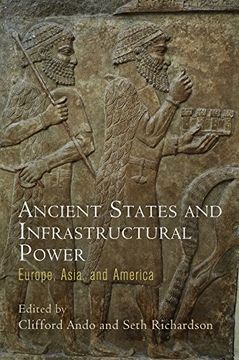Share
Ancient States and Infrastructural Power: Europe, Asia, and America (Empire and After) (in English)
Clifford Ando
(Illustrated by)
·
Seth Richardson
(Illustrated by)
·
University of Pennsylvania Press
· Hardcover
Ancient States and Infrastructural Power: Europe, Asia, and America (Empire and After) (in English) - Ando, Clifford ; Richardson, Seth
$ 12.78
$ 15.98
You save: $ 3.20
Choose the list to add your product or create one New List
✓ Product added successfully to the Wishlist.
Go to My WishlistsIt will be shipped from our warehouse between
Friday, July 19 and
Tuesday, July 23.
You will receive it anywhere in United States between 1 and 3 business days after shipment.
Synopsis "Ancient States and Infrastructural Power: Europe, Asia, and America (Empire and After) (in English)"
While ancient states are often characterized in terms of the powers that they claimed to possess, the contributors to this book argue that they were in fact fundamentally weak, both in the exercise of force outside of war and in the infrastructural and regulatory powers that such force would, in theory, defend. In Ancient States and Infrastructural Power a distinguished group of scholars examines the ways in which early states built their territorial, legal, and political powers before they had the capabilities to enforce them. The volume brings Greek and Roman historians together with specialists on early Mesopotamia, late antique Persia, ancient China, Visigothic Iberia, and the Inca empire to compare various models of state power across regional and disciplinary divisions. How did the polis become the body that regulates property rights? Why did Chinese and Persian states maintain aristocracies that sometimes challenged their autocracies? How did Babylon and Rome promote the state as the custodian of moral goods? In worlds without clear borders, how did societies from Rome to Byzantium come to share legal and social identities rooted in concepts of territory? From the Inca empire to Visigothic Iberia, why did tributary practices reinforce territorial ideas about membership? Contributors address how states first claimed and developed the ability to delineate territory, promote laws, and establish political identity; and they investigate how the powers that states appropriated came to be seen as their natural and normal domain. Contributors: Clifford Ando, R. Alan Covey, Damián Fernández, Anthony Kaldellis, Emily Mackil, Richard Payne, Seth Richardson, Wang Haicheng, John Weisweiler.

